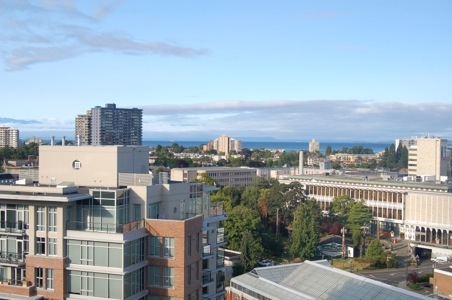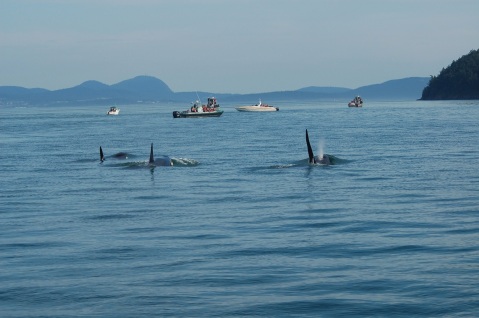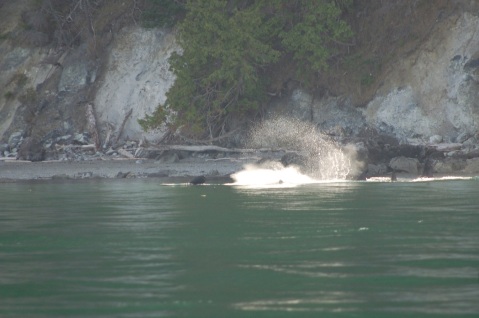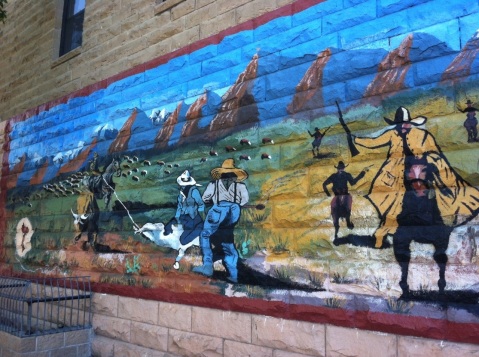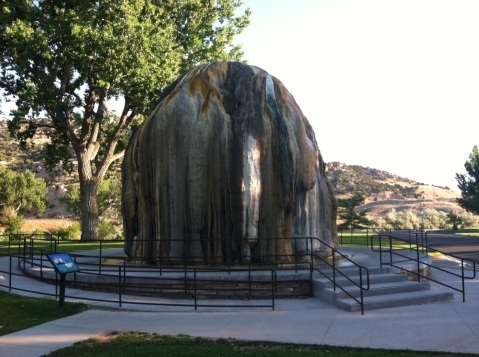Finding our voice
One aspect of calling – where one's vocation intersects with one's work – is finding one's voice. Many people, I believe, have a sense of dislocation because they are not able to express the deepest insights and passions of their hearts in ways that bring them satisfaction. They yearn to do so, but don't feel they have the words or ability to command attention that allows them to gain a hearing in their wider community. I hope that we would be able to find opportunities to make our own contributions to community, without hesitation or fear that our words are inadequate.
Beginning with the narrative of an Alaskan teacher's role in a small community school, Elaine's Circle by Bob Katz, I came across the following:
What we’re up to …
On Sunday, CJ, Grace, Christopher and I began a two week driving tour through the Canadian Rockies and on to the cities of Vancouver and Victoria. We will stay in Wyoming and Montana as we make our way into Canada on highway 93, which takes us into the British Columbia side of the mountains. We’ll spend a few days in the town of Invermere, which is a gateway to the Kootenay National Park and the surrounding parks of Yoho, Banff, Glacier and Jasper.
From the mountains, we’ll travel down to Vancouver and spend a few days exploring the area before we go on to Victoria and then the long trip back to Denver.
Our children, now teenagers, are reluctant participants – at least on the surface of things – but we’ve found that if we build in adequate hours of sleep, fun things like mineral hot springs, and the occasional downloaded movie, they are pretty good sports about it.
Of course there are things they are missing from home – friends, hanging out, and the various sports opportunities, but they’ll survive (and their teams will be fine without them).
As we go, I remember the folks at St. Gabriel, and especially those going through physical or emotional challenges. I am also very grateful to Fr. Art, senior warden John Casani, and the entire wonderful staff and vestry at St. Gabriel who are leading the congregation through this summer. And, I remain very grateful to St. Gabriel for allowing us this opportunity to do things we would not ordinarily be able to do.
More as I am able …
July 5, Reflection Part B
Building on the last post, another book that I am currently enjoying (what a wonderful blessing it is to be reading real, book-length, work this summer!) is Culture Making by Andy Crouch. Culture Marking is a study of, obviously, culture and what makes up culture – cultural goods. At another level, it is addressed to Christians who ask the perennial question “How ought Christians to engage culture?”
One cannot go very far without encountering H. Richard Niebuhr's classic Christ and Culture, but Crouch doesn't go in this direction (at least not yet; I'm only 1/3rd of the way through).
Crouch looks at the various postures that Christians (especially of an Evangelical sort – the mainline has a tendency to remain in a posture of profound accommodation to culture) have traditionally undertaken with regard to culture: condemning culture (the Fundamentalist approach); critiquing culture (esp. post-World War II thoughtful evangelicals); copying culture (setting up parallel pale imitators of cultural goods as seen in pop Christian music, literature and art {Thomas Kinkade?}; and, finally, consuming culture – uncritically from a Christian point of view. All of which, says Crouch, are inadequate means of contributing to the common good let alone gaining the attention of the wider world so that God's kingdom might be extended in the real of culture.
Thinking still about freedom and responsibility, this time in the area of culture, I picked up on the following section from Andy Crouch:
July 5 Reflection
JULY 5
Yesterday’s Independence Day celebrations, whether they were expressed in the simple actions of a family gathered around the grill and passing the football back and forth (as we tried to do yesterday surrounded by the haze and heat of this stressful summer season), or by going public and celebrating by way of a parade through the town square, allowed a time for Americans to reflect on freedom and responsibility.
I’ve been thinking this summer about many things having to do with calling and vocation, especially in light of the Scriptural story of Creation, Fall, Redemption and Consummation (or Re-Creation as some would prefer), and the roles that human beings, created in God’s image, are to play in this story. This has to do, in some way, with being responsible to God and to our calling in the world. It has to do with exercising freedom in such a way that it is not only freedom from something [sin, death, evil, the corrupting forces of the ‘world, the flesh and the devil’], but also freedom for something: freedom to contribute to the common good, freedom to create and cultivate “cultural goods” in the world, freedom to make sense of life for oneself and one’s family.
From the Ethics and Public Policy Center, years ago, I learned the notion that freedom always entails these two ends of the arc: freedom from and freedom for. Most Americans (including most American Christians) understand the notion of freedom from, but I daresay we struggle mightily with freedom for. This is where responsibility comes in. In what ways are we responsible for ourselves and families, even our neighbors? As we pursue our individual good and flourishing, do we seek the flourishing of those outside ourselves? Do we seek the flourishing of the city, for instance (see Jeremiah 29: 4-7)?
The pressures we face to live faithfully are tremendous. We often feel the weight of forces beyond our control long before they come into view. It seems that many people today are in a very thin place where they have little resources of faith or community to fall back upon when things become difficult. Rather than enjoying the view from the upper deck of a large ocean liner, they feel that they are in a very small dinghy, easily capsize-able and that if they allow themselves one slip up they will find themselves at cross current to a growing wave that threatens to undo everything in the blink of an eye.
It does not seem enough to have personal faith, especially if this faith is not integrated into all of life. If one’s faith is simply an ‘add on’ to all the other perspectives one holds, it is bound to be insufficient to carry one through.
I’ve been reading Steven Garber’s Fabric of Faithfulness and seen how to have a telos sufficient to orient one’s praxis through all of life (and especially through, in Garber’s memorable image, The Valley of the Diapers) it is important to have in place three bounding “forces”: a worldview that orients one’s way of life; mentors who help shape and share in the worldview as it is lived out not only in the realm of ideas but also, crucially, through life itself; and a living, breathing community through which, as people created to relate one to the other, we reconstitute our moral selves day by day and week by week.
Here is a summary from Garber’s researches and reflection on the lives of those who continue to weave belief and behavior as they endure the ‘slings and arrows of outrageous fortune’ that life inevitably brings with it.
I pick up with the following from sociologist Peter Berger:
To have a conversion experience is nothing much. The real thing is to be able to keep taking it seriously; to retain a sense of its plausibility. This is where the religious community comes in.
Garber then writes:
From the beginning of this study, we have explored the challenge of facing up to modernity, particularly as it is experienced by the contemporary college student. In attempting to understand the nature of the challenge, we have look at a variety of factors that bear down on the formation of moral meaning in the modern world. Some are written into our social context, such as industrialization, and all that that has meant in terms of urbanization, mass communication and education. Some are argued on an intellectual plane, such as the dualism of facts and values, a debilitating moral vision which drives the way we converse about anything and everything in the public square. The end of it all, though, for ‘ordinary people living ordinary lives,’ is a profound loss of coherence.
And yet some have held on. We have told the stories of those who have not only survived but thrived. In contrast to every expectation, they still believe in the vision of a coherent life – personally as well as publicly – having made choices about the meaning of their lives which have sustained them in the more complex responsibilities of adulthood. What is it that so marks their lives, that gives them the skills to stand? As their stories were told, during the critical years between adolescence and adulthood they were people who (1) formed a worldview that could account for truth amidst the challenge of relativism in a culture increasingly marked by secularization and pluralization; (2) found a mentor whose life ‘pictured’ the possibility of living with and in that worldview; and (3) forged friendships with folks whose common life offered a context for those convictions to be embodied. In different areas of the world and in different arenas of life, they are people who have woven together a fabric of faithfulness. [Garber, 159-160]
Worldview, mentor, community: three guiding dynamics without each of which, it seems, our lives are susceptible to drift off into incoherence. And the freedom that we presently celebrate, without the bounded “responsibility” of these dynamics, can easily devolve into a narcissism of the most dangerous kind.
A month’s reflection
July 1, 2012
Pausing to reflect on the first month of my sabbatical, and wanting to take stock of where I am vis. where I had hoped to be be at this time in my reading and study (as well as the other components of personal and family renewal) on the whole, I guess I can say, I’m pleased with the first month’s accomplishments. But I am also, looking ahead, feeling the close of the sabbatical coming into view, as well. This end will lead me, in July, to have substantive goals to achieve and to set the context for my wrapping up in August and preparing to re-enter the life of the parish – the lives of the cherished community that is St. Gabriel the Archangel.
June itself flew by. The first couple weeks were spent at the Center for the Theology of Childhood with Jerome Berryman, who has graciously and with encouragement followed my reading progress and gently prodded me onward. His attempts to have me focus on the buffet before me, choosing delicacies to eat, not at random but rather with some coherence in view are welcome and appreciated, but are needing some heeding on my part. It would be easy for me to either sit and stare in a kind of wide-eyed paralysis at all that is potentially mine to consume, or to dive right in and engorge myself at the table – neither of which are very good options!
Frankly, two factors are at play in my struggles to limit the ‘scanning’ part of this sabbatical. One is that I am enjoying the simple opportunity for sustained reading. Anticipating seminary training and ordination so many years ago, now, the projection in my mind regarding parochial ministry was that it would somehow open wide vistas for reading and reflection upon God, life, understanding the scriptures and so on. Now, I know that there are some pastors who embody this image of the parson sitting in his study in the morning, and traveling throughout out the parish on home-based visitation in the afternoon. Only in Northumberland County, Virginia, while serving a curacy at St. Stephen’s, Heathsville and St. Mary’s, Fleeton, did I have a semblance of this pattern, and even then I lacked the discipline to make the most of that opportunity. So, with the gift of this sabbatical, to actually have a set of books on my study table is amazing in so many ways. Jerome has helped me read with intention and purpose, but I just want to stay put and scan and scan some more. In the week to come it is important that the vision take shape and come into focus.
The other factor that has made focus a challenge have been the several pieces carved out of the reading time. First, the challenge of having home responsibilities with the house itself needing some attention and the two teenagers who are not always content to do their own thing (as long as they have someone around to drive them somewhere, that’s fine). Second, there were three experiences (a retreat led by my friends Dr. Steve Garber and The Rev. Bill Haley hosted by me here in Colorado; the trip to New York and Boston that involved my family going on all manner of transportation – planes, trains, automobiles, buses, taxis, boats; and a three-day intensive “Learning Community” held in McLean, Virginia) that involved a significant amount of planning, preparation and travel in June, and these all took time away from the sustained habit of reading and reflection. This is not to say that they have not been beneficial for the overall project. Quite the contrary! But, as in life itself generally, I will have to be intentional and focused on using the available time in the most productive and fruitful way.
As writer Annie Dillard reminds us, “How we spend our days is, of course, how we spend our lives.” I’ll think on that this day.
Today is Sunday, July 1, a day of rest. Monday is another day, another day of work and labor. May it, and all the days, flow toward the next day of rest, but may each day be sufficient unto itself, lived as best I can in coherence with God my Creator and Redeemer, my family and neighbors, as well as with myself.
Along with all this, I’ll also remember the credo of an ancient saint:
I bind unto myself today the strong Name of the Trinity;
by invocation of the same, the Three in One and One in Three.
Postscript: In my next post, I will share some of the content of the three learning opportunities I’ve enjoyed this past month, and post some thoughts on where this project is going…
